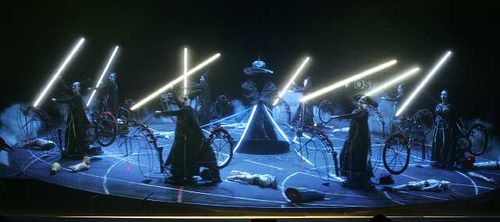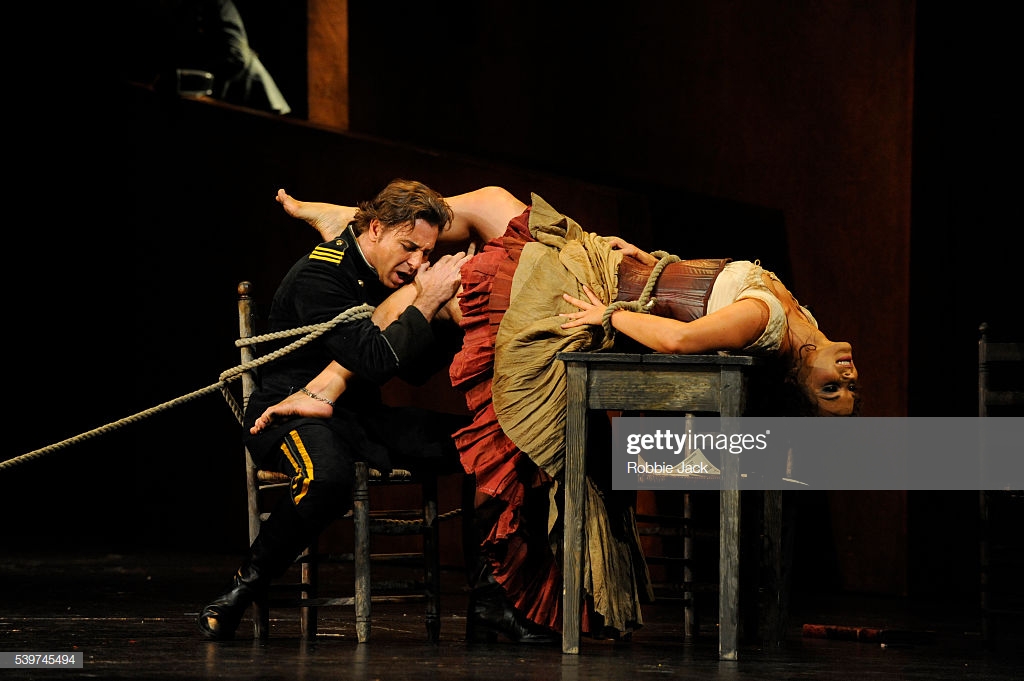|
SATURDEE OPRY LINKS 62:
Good/Bad Production Edition

The ridiculous Achim Freyer/LA Opera "Ride of the Valkyries," from
Wagner's "Die Walkure." Bicycles and light-sabers, I ask you.
|

The S&M "Carmen." Roberto Alagna and Elina Garanca.
Can cunnilungus be far behind? |
Saturdee Opry Links Overture!
"Carmen," by Bizet. Slam-bang.
https://www.youtube.com/watch?v=PQI5LtRtrb0
1.
These days, every "Carmen" is nearly topless, with (usually massive) breasts
pumped, primed, pushed like rising zeppelins. And "Carmen" is generally no more
lascivious than Miley Cyrus, openly suggesting and/or simulating fornication,
fellatio, and other forms of uh, good fellowship. It's ridiculous, of course,
part of these dumbed down, hypertrophic, vulgar times. So here is a pleasing (I
hope) throwback to the soprano who essentially owned the role at the
Metropolitan Opera in the '40's, and '50's, Rise Stevens. A civilized "Carmen,"
where all was conveyed in voice and subtle gesture. The "Habanera," or "L'amour
est un oiseau rebelle" ("Love is a rebellious bird.")
Setting: A square in Seville
Synopsis: After appearing out of the cigarette factory, Carmen seductively sings
about love and its unpredictable actions.
https://www.youtube.com/watch?v=pCYHALudt1k
Translation:
http://www.aria-database.com/search.php?individualAria=42
Just for contrast, here is wonderful Anna Catarina Antonacci and her trained
breasts. (I am omitting specimens with flagrant S&M.)
https://www.youtube.com/watch?v=KJ_HHRJf0xg
2.
The "Ride of the Valkyries" from Wagner's "Ring" cycle, has been staged in
almost every conceivable fashion, but this is one of the funniest, or, depending
on your viewpoint, most creative. It is fun to watch, at least, though I don't
imagine Valkyries---goddesses on flying horses who carried fallen soldiers to
Valhalla---on see-saws, know what I mean? Great singing here, regardless. This
is the recent Met production by Robert LePage (new one coming in 2018), in which
a huge, creaky machine transformed into different abstractions, from scene to
scene. Good or bad, you decide.
https://www.youtube.com/watch?v=xeRwBiu4wfQ
Translation:
http://www.murashev.com/opera/Die_Walk%C3%BCre_libretto_English_Act_3
Then we have the version introduced by Bob Hope.
https://www.youtube.com/watch?v=YC6f8FbnVMQ&list=RDYC6f8FbnVMQ
3.
Sticking to well-known scenes from opera, here is "La Donne e Mobile," from an
unusual Met production of Verdi's "Rigoletto"---set, apparently, in. . .Las
Vegas! A prevalent idea in opera these days is to make the settings as wildly
improbable (I would say preposterous) as possible, and then claim all sorts of
intellectual import. Yawn. But the singer is quite good, Piotr Beczala. With
English captions.
Setting: The inn of Sparafucile
Synopsis: The Duke of Mantua, disguised as a soldier, sings that all women are
fickle and that they will betray anyone who falls in love with them. (Note: No,
haven't seen many soldiers in tuxedos recently.)
https://www.youtube.com/watch?v=EnXLthi83yU
Translation:
http://www.aria-database.com/search.php?individualAria=265
4.
There was an enormous flap about "Madame Butterfly," (so to speak) when it premiered---as a
flop---at La Scala in 1904. Roars, howls, laughter, bellowing, guffaws greeted
the opera, which since became one of the most loved in the genre. Can you
believe it? The acts were too long, the Japanese folk elements artificial, and
Puccini was accused of cribbing from his own work (the act 3 duet of "Boheme")---so
wrote outraged critics. (Today, the opera is ridiculously criticized by
politically correct fascists for "yellowface.") "Butterfly" is almost always
staged intelligibly, intelligently, with liberties erring on the side of
symbolism. Here is a bit of a novelty---the very pleasing animated sequence of
"Un bel di. . ." ("One fine day. . .") from the engaging "Opera Imaginaire."
https://www.youtube.com/watch?v=RPXQbgJ5jTY
Setting: Butterfly's house
Synopsis: Three years have passed since Butterfly's American husband left her.
Her servant Suzuki, tries to convince her that he isn't coming back, but
Butterfly is convinced that he will. She sings of the day that he will return.
She dreams of him sailing into the harbor and climbing up the hill to meet her.
Translation:
http://www.aria-database.com/search.php?individualAria=38
More about Opera Imaginaire:
https://en.wikipedia.org/wiki/Op%C3%A9ra_imaginaire
5.
Not all of the most loved moments in opera are arias, duets, etc., involve the
main characters. There are wonderful ballets in opera, and choral pageants. The
chorus, "Va Pensiero," from Verdi's "Nabucco," became a de facto Italian
national anthem, and there is nothing more delicately arresting than the
"Humming Chorus" from "Madame Butterfly." Well, here is a fun bit from "La
Traviata"---the rousing gypsy chorus and matador dance. "Noi siamo Zingarelle"
("We are gypsies.") Nice, traditional production, to boot!
https://www.youtube.com/watch?v=Ixbrot9hq5U
Partial translation:
http://www.opera-arias.com/verdi/la-traviata/noi-siamo-zingarelle/
Full translation: (search for "gypsies")
http://www.murashev.com/opera/La_traviata_libretto_English_Italian
Oh, and by the way. . .
https://www.youtube.com/watch?v=U8OukQGcNs8
6.
Gounod's "Faust" is another opera that had a rough beginning. It was rejected by
the Paris Opera, for starters, for not being "showy" enough (hard to believe.)
And there were cuts, and showings in lesser venues---and the addition of a
ballet sequence---before it caught on in 1862. It has been standard repertory
ever since, which is more, sadly, than can be said for Gounod's other eleven
operas. (You know Gounod, of course, from his arrangement of "Ave Maria.") Well,
here is a scene from a "Faust" production that is creative without being
nonsensical or pseudo-intellectual. He said, pretentiously. Here is "Le Veau
D'or," or "The Golden Calf," featuring a rather large one. The great bass,
Ruggiero Raimondi, does the honors. With English captions.
Synopsis: Appearing in the midst of a celebration by Valentin, Wagner, and their
student friends, Mèphistophélès sings about greed and men's susceptibility to
it. No! Shocking.
https://www.youtube.com/watch?v=x66TYd9nAMI
Translation:
http://www.aria-database.com/search.php?individualAria=372
7.
This Wagner production makes the one posted earlier (the Met's recent "Walkure")
look old-fashioned and quaint. A pretty good example of the idiocy permeating
operatic productions today; the product of directors and producers who are
legends in their own hinds. First of all, you have lots of people in Spiderman
suits suspended from the ceiling. Add to that costumes that are like rejects
from "Lost in Space" for the rest of the cast---and the fact that the "action"
has nothing to do with the events supposedly taking place, and you have a feast
for poseurs and lightweights. Oh, well, but it does have the virtue of weird,
anyhow. This is the "Entrance of the Gods into Valhalla" from "Das Rheingold,"
in which the hopelessly corrupt king, Wotan, essentially sells his soul---and
the souls of all around him---for a new home in the clouds (built by giants, no
less), Valhalla. All proceed across a rainbow bridge into the new digs. The
rough analogue for the average person: a weekend in Vegas. (Coming soon: the
"Vegas Ring Cycle," no doubt.) This is an ending that is supposed to be
dramatic, moving, fraught with implication and irony, and yes, even triumphant,
in a fateful, bittersweet way. Er. . .doesn't quite happen here. I'd advise not
even thinking about this very much. (Note: very weak applause fully warranted.)
https://www.youtube.com/watch?v=BryfDHcjD9o
Translation: (scroll down to "Golden at eve")
http://www.murashev.com/opera/Das_Rheingold_libretto_English_Act_4
8.
What was I just saying about an operatic weekend in Vegas? The Met beat me to
it, with last year's insane production of "Rigoletto," set right in Sin City.
(See previous post, "La Donne e Mobile.") Too bad, in this case, that "what goes
on in Vegas didn't "stay in Vegas." Understand that "Rigoletto," by Verdi, was
based on a play by Victor Hugo, a tragedy involving the randy Duke of Mantua,
his hunchbacked court jester, Rigoletto, and Rigoletto's beautiful daughter,
Gilda. The opera's original title, "La maledizione" (The Curse), refers to the
curse placed on both the Duke and Rigoletto by a courtier whose daughter had
been seduced by the Duke with Rigoletto's encouragement. The curse comes to
fruition when Gilda likewise falls in love with the Duke and eventually
sacrifices her life to save him from the assassins hired by her father. Got that
straight? Take it away, Vittorio Grigolo! "Questa O Quella," or "This one or
that one."
https://www.youtube.com/watch?v=PgjNrUcpctY
Translation:
http://www.aria-database.com/translations/rig02_questo.txt
For comparison:
https://www.youtube.com/watch?v=k_zp_a1r7CY
9.
Just so you know. Mimi never had chemotherapy. She did not go to a cancer ward,
or any hospital at all. But don't tell that to the producers of a new "Boheme"
in Oslo. This brain-trust felt compelled to stage "Boheme" in, uh, "fresh"
fashion. Evidently Puccini's score and stage directions are inadequate, and the
story just not sad enough! Here is the summary:
"A cancer victim lies dying in an intensive care unit, the twenty-first-century
poet Rodolfo at her side. When the EKG machine flatlines and a medical team
fails to revive her, Rodolfo, wild with grief, reanimates her in his own fantasy
world as the nineteenth-century Mimì. A hospital janitor becomes Marcello,
doctors become Colline and Schaunard, and a nurse becomes Musetta."
As Jack Paar used to say a hundred years ago, "I kid you not."
Marita Solberg's singing is perfectly wonderful, even if she looks more fit for
a role on "E.R."
https://www.youtube.com/watch?v=ygK-dhLrHv4
Translation:
http://www.aria-database.com/translations/boheme2_simi.txt
FINAL BOW:
Now here is the way to present an opera. Step one: Hire Zefferelli. Even at 94,
as he is today. Here is the conclusion of his treatment of "Turandot," by
Puccini. No Spiderman costumes, no human mountains, no hospital wards.
The plot of this fairy tale, in this scene:
The Prince has a riddle for Turandot: "You do not know my name. Tell me my name
before sunrise, and at dawn, I will die." Turandot accepts. She admits that ever
since she met the Prince, she realized she both hated and loved him. She asks
him to ask for nothing more and to leave, taking his mystery with him. The
Prince, however, then reveals his name: "Calaf, son of Timur – Calaf, figlio di
Timur", thereby placing his life in Turandot's hands. She can now destroy him if
she wants Turandot and Calaf approach the Emperor's throne. She declares that
she knows the Prince's name: Diecimila anni al nostro Imperatore! – "It is ...
love!" The crowd cheers and acclaims the two lovers (O sole! Vita! Eternità).
https://www.youtube.com/watch?v=m2CWpTPCnPY
Translation: (scroll to scene two)
http://www.murashev.com/opera/Turandot_libretto_English_Act_3
Saturdee Opry Links Encore!
Enrico Caruso sings the Neopolitan song, "A Vucchella."
https://www.youtube.com/watch?v=9JtMTRYFQ6w
Translation:
http://www.lieder.net/lieder/get_text.html?TextId=250
Back to Opera Links
Back to Home Page
|



